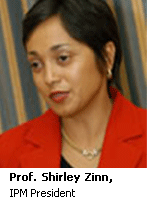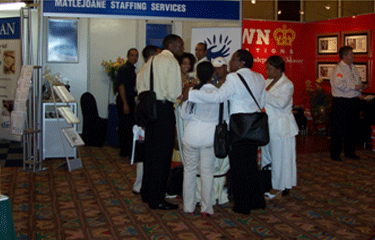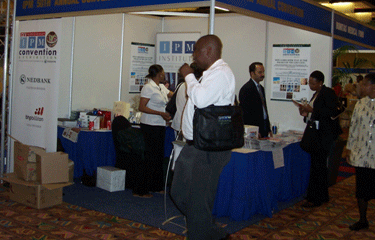 ReConnect Africa is a unique website and online magazine for the African professional in the Diaspora. Packed with
essential information about careers, business and jobs, ReConnect Africa keeps you connected to the best of Africa.
ReConnect Africa is a unique website and online magazine for the African professional in the Diaspora. Packed with
essential information about careers, business and jobs, ReConnect Africa keeps you connected to the best of Africa.


 For 50 years, the Institute of People Management (IPM) has led the way in addressing people management issues in South Africa. The 2006 50th Annual Convention of the IPM with the theme of ‘Driving High Performance through People’ brought an array of international speakers, experts and HR professionals together in Johannesburg, and highlighted the key challenges facing South Africa in creating a high performance workplace.
For 50 years, the Institute of People Management (IPM) has led the way in addressing people management issues in South Africa. The 2006 50th Annual Convention of the IPM with the theme of ‘Driving High Performance through People’ brought an array of international speakers, experts and HR professionals together in Johannesburg, and highlighted the key challenges facing South Africa in creating a high performance workplace.
Professor Shirley Zinn, President of the IPM and Human Resources Director of South African bank, Nedbank, opened the Conference. Welcoming the 700 delegates to the Conference, Zinn spoke of the role of Human Resources management today and the challenges HR professionals face in redefining their role within business.
“For a long time our role was relegated to hiring, firing, administration and transactional activities”, she said. “HR has been in a revolution and this requires very different competencies from us.”
“We have a fantastic opportunity to really make a difference.”
One of the key aims of the 2006 Conference, she said, was “to highlight the importance of HR and the role HR can play in meeting the diverse challenges South Africa faces.” Zinn referred to the national imperatives and challenges AsgiSA raises for the HR professional in people terms by encouraging growth and job creation.
“We need to look at ourselves critically. What is our role in all of this?” she asked. “Are we involved in shaping the discourse or are we just going to stand on the sidelines?”
Zinn urged HR practitioners to take up the challenge and to seize the initiative. “We have a fantastic opportunity to really make a difference,” she said. “HR practitioners are the only people in an organisation to assess skills issues and to work with managers to make a difference.”
Zinn spoke of the challenges inherent in the country’s labour legislation – “we have a battery of legislation around us”, pointing out that “the laws and regulations clearly have a purpose in our country” and highlighted the value of effective learnership opportunities to give young people work experience. Speaking of HR’s role to lobby and promote workable solutions, she asked: “where are our voices in addressing the issue of unemployed graduates? – we’re quick at pointing out the flaws but are we making a meaningful contribution to shaping the solutions?”
On the challenge of HR’s role in managing HIV/AIDS effectively, Zinn said. “We have a critical role to play to ensure that we can start curbing the scourge of HIV/AIDS. No economy can sustain itself without a strong programme in this area.”
Developing the HR Professional
“Our ability to fulfil our role starts with our ability to develop and grow ourselves,” Zinn concluded. “HR continues to break new ground and each one of us has to decide our own contribution and our own personal commitment to this.”
Urging delegates to build their competencies and to take a strategic role, Zinn stressed the need for supporting, enabling and empowering each other to work towards a common vision and purpose for HRM in South Africa today and “to make South Africa not only a great place to live but also a great place to work.”
‘What Really Works’
 The plenary presentation by Professor William Joyce of the Amos Tuck School of Business in the USA centred on the extensive research he conducted on management over a 10-year period. The US$8 million Evergreen Study, funded by McKinsey and which led to Joyce’s best-selling book ‘What Really Works’, was a study which looked at 200 management practices in 160 companies.
The plenary presentation by Professor William Joyce of the Amos Tuck School of Business in the USA centred on the extensive research he conducted on management over a 10-year period. The US$8 million Evergreen Study, funded by McKinsey and which led to Joyce’s best-selling book ‘What Really Works’, was a study which looked at 200 management practices in 160 companies.
The study set out to identify why some companies outperform others and what must be done to make a company great. Citing the rapid increases in the sophistication of technology, Joyce said, “This is the most interesting time in the history of management.”
Joyce argued that the average working week has increased at precisely when more people are saying that they want more to life than just work, posing a challenge to the HR professional.
Foundation and Complementary Practices
The study resulted in Joyce and his team identifying four key – or foundation – practices i.e. traits possessed by firms that excelled over the 10 period of analysis: strategy, execution/operational excellence, an adaptive, meaningful culture and a fast, flexible structure. The firms that exhibited sustained business performance had what Joyce termed the ‘4+2 formula’ i.e. in addition to the four foundation practices, they also exhibited at least 2 of the complementary practices which were defined as: engaging and developing talent, leadership, innovation and growth.
Human Resources Management in South Africa
The visibility of the HR role was further emphasised by Peter Cheese, Global Head of HR for Accenture in his presentation.
“The organisation that can capture the heart of its employees is going to be the one that gets the best results.”
“HR has never been more in the spotlight than it is today,” he said. “The pace of change requires new skills and new targets, and workforce and HR performance are a top executive priority.”
Referring to a recent survey of 100 companies across 28 industries in South Africa, Cheese pointed out that the two big issues consistently raised were increasing the non-white management pool and skills development.
HR needs to develop its own and the organisation’s leadership capability, he said, with a clear vision and understanding of the magnitude of change. “Get the basics right; understand the business priorities and focus on execution and the delivery of quick wins.”
From Capitalism to Humanism
“The organisation that can capture the heart of its employees is going to be the one that gets the best results”, said Joseph Johnson, CEO of US consultancy, the Telein Group. In a riveting presentation on ‘Getting the best out of your Employees’, Johnson – who has worked with leading businesses in the USA – spoke of the need to move away from capitalism to humanism by creating new methods of working that result in a ‘win/win’ situation for employees and the business.
“Those organisations that capitalise on this new environment will be the ones that win in the 21st century,” he said. Johnson defined the approach to humanism as ensuring clarity of purpose, a common vision and creating effective relationships with all stakeholders i.e. those who have a stake in the success or failure of your business. He spoke of the need to exercise leadership and for business to empower people by enabling them to feel authorised, competent and motivated to act independently in the best interest of the organisation. “Give people the skills and information for them to be and feel part of the whole system.”
Engaging the human spirit is what will make the difference, Johnson suggested. “Focus on what creates successful performance and outcomes will come by the way. Focus on the means and it will make the ends.”
Attracting and Retaining Skills
The greatest challenge in attracting skills, according to search consultant and panellist Wendy Weir, is researching and understanding where those talent pools lie. With staffing mistakes costing an estimated 15 times annual salary, HR professionals need to have a clear idea of human capital mapping in Africa and globally, said Weir. Bringing South Africans outside the country back to being at the forefront of change was also an issue highlighted during the event.
The challenge of retaining skills was one that a number of speakers addressed during the IPM Convention. HR’s role in proactively leading, nurturing and developing talent was described as a critical contribution to ensuring retention.
“People will stay with an organisation as long as they feel they are adding value.”
Commenting on what she described as “the myth of job hopping among black managers”, Keamogetse Moula Nyoka of search specialists Spencer Stuart pointed out that “people will stay with an organisation as long as they feel they are adding value.”
The key message on retention strategies centred on companies implementing good inductions for new employees, enabling employees to see themselves as part of the organisation and tracking performance. The issue of scarce talent leaving a business was described as colour blind, with one speaker pointing out that the issue is universal and it is only South Africa’s history that has caused the application of the colour factor.
“Talent wants to work for successful organisations,” delegates were told. “It is the role of the business and the boss to make sure that talent wants to stay.”
Photo Gallery
Exhibition alongside the IPM 50th Anniversary Convention


Delegates at Convention Gala Dinner


